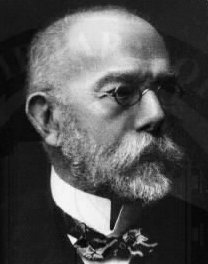- Robert Koch
Infobox Scientist
name = Robert Koch

imagesize=180px
birth_date = birth date|1843|12|11|mf=y
birth_place =Clausthal ,Kingdom of Hanover
death_date = death date and age|1910|5|27|1843|12|11|mf=y
death_place =Baden-Baden ,Grand Duchy of Baden
field =Microbiology
work_institutions = Imperial Health Office, Berlin,University of Berlin
alma_mater =University of Göttingen
doctoral_advisor =Friedrich Gustav Jakob Henle
known_for = Discoverybacteriology Koch's postulates ofgerm theory
Isolation ofanthrax ,tuberculosis andcholera
prizes =Nobel Prize in Medicine (1905)Heinrich Hermann Robert Koch (
December 11 1843 –May 27 1910 ) was a Germanphysician . He became famous for isolating "Bacillus anthracis " (1877), the tuberculosis bacillus (1882) and the vibrio cholera (1883) and for his development ofKoch's postulates .He was awarded the
Nobel Prize in Physiology or Medicine for his tuberculosis findings in 1905. He is considered one of the founders ofmicrobiology —he inspired such major figures asPaul Ehrlich andGerhard Domagk .Biography
Heinrich Hermann Robert Koch was born in Clausthal,
Germany as the son of a mining official. He studied medicine underFriedrich Gustav Jakob Henle at theUniversity of Göttingen and graduated in 1866. He then served in theFranco-Prussian War and later became district medical officer in Wollstein (Wolsztyn),Prussian Poland . Working with very limited resources, he became one of the founders ofbacteriology , the other major figure beingLouis Pasteur .After
Casimir Davaine showed the direct transmission of the anthrax bacillus between cows, Koch studied anthrax more closely. He invented methods to purify the bacillus from blood samples and grow pure cultures. He found that, while it could not survive outside a host for long, anthrax built persistingendospores that could last a long time.These
endospore s, embedded in soil, were the cause of unexplained "spontaneous" outbreaks of anthrax. Koch published his findings in 1876, and was rewarded with a job at the Imperial Health Office inBerlin in 1880. In 1881, he urged the sterilization of surgical instruments using heat.In
Berlin , he improved the methods he used in Wollstein, including staining and purification techniques, and bacterial growth media, includingagar plates (thanks to the advice of Angelina and Walther Hesse) and thePetri dish , named after its inventor, his assistantJulius Richard Petri . These devices are still used today. With these techniques, he was able to discover the bacterium causingtuberculosis ("Mycobacterium tuberculosis ") in 1882 (he announced the discovery onMarch 24 ). Tuberculosis was the cause of one in seven deaths in the mid-19th century.In 1883, Koch worked with a French research team in
Alexandria ,Egypt , studyingcholera . Koch identified thevibrio bacterium that caused cholera, though he never managed to prove it in experiments. The bacterium had been previously isolated by Italian anatomistFilippo Pacini in 1854, but his work had been ignored due to the predominance of themiasma theory of disease . Koch was unaware of Pacini's work and made an independent discovery, and his greater preeminence allowed the discovery to be widely spread for the benefit of others. In 1965, however, the bacterium was formally renamed "Vibrio cholera Pacini 1854".In 1885, he became professor of
hygiene at the University of Berlin, then in 1891 he was made Honorary Professor of themedical faculty and Director of the new Prussian Institute for Infectious Diseases (eventually renamed as theRobert Koch Institute ), a position from which he resigned in 1904. He started traveling around the world, studying diseases inSouth Africa ,India , and Java.Probably as important as his work on tuberculosis, for which he was awarded a Nobel Prize (1905), are "
Koch's postulates ", which say that "to establish that an organism is the cause of adisease , it must be":* found in all cases of the disease examined
* prepared and maintained in apure culture
* capable of producing the originalinfection , even after several generations in culture
* retrievable from an inoculatedanimal and cultured again.After Koch's success the quality of his own research declined (especially with the
fiasco over his ineffective TB cure "tuberculin "), although his pupils found the organisms responsible fordiphtheria ,typhoid ,pneumonia ,gonorrhoea , cerebrospinalmeningitis ,leprosy ,bubonic plague ,tetanus , andsyphilis , among others, by using his methods.Koch died on May 27, 1910 from a heart-attack in
Baden-Baden , aged 66.Honors and awards
Koch crater on the
Moon was named after him. TheRobert Koch Prize and Medal were created to honour Microbiologists who make groundbreaking discoveries or who contribute to global health in a unique way. The now-defunct Robert Koch Hospital atKoch, Missouri (south ofSt. Louis, Missouri ), was also named in his honor. A hagiographic account of Koch's career can be found in the 1939 Nazi propaganda film "Robert Koch, der Bekämpfer des Todes", directed byHans Steinhoff and starringEmil Jannings as Koch.ee also
*
History of medicine
*Timeline of medicine and medical technology References
*
*
*External links
* [http://nobelprize.org/medicine/laureates/1905/koch-bio.html Robert Koch Biography at the Nobel Foundation website]
* [http://vlp.mpiwg-berlin.mpg.de/people/data?id=per99 Robert Koch Biography and bibliography] in theVirtual Laboratory of theMax Planck Institute for the History of Science Persondata
NAME= Koch, Robert
ALTERNATIVE NAMES=
SHORT DESCRIPTION=Germanphysician and bacteriologist
DATE OF BIRTH=birth date|1843|12|11
PLACE OF BIRTH=Clausthal ,Germany
DATE OF DEATH=1910-05-27
PLACE OF DEATH=Baden-Baden ,Germany
Wikimedia Foundation. 2010.
